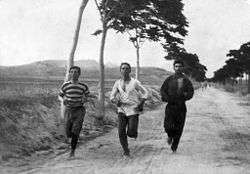Charilaos Vasilakos
|
| ||||||||||||||
Medal record
| ||||||||||||||
|---|---|---|---|---|---|---|---|---|---|---|---|---|---|---|
Charilaos Vasilakos (Greek: Χαρίλαος Βασιλάκος, 1875 – 1 December 1964)[4] was a Greek athlete and the first man to win a marathon race.[5] He also won a silver medal at the 1896 Summer Olympics in Athens.
Vasilakos was born in Piraeus, Greece.[4]
On March 22, 1896[6] Greece held the first modern Panhellenic Games. The main purpose of the games was to help the country formulate the team that would compete in the first Modern Olympic Games later the same year. All participants were members of Greek sports clubs. Vasilakos was raised in a mountainous village in the Mani peninsula called Petrina and already had a reputation as a strong long-distance runner. He won the marathon race with a time of 3 hours and 18 minutes.[4][7][8]
Vasilakos was one of seventeen athletes to start the Olympic race on April 10, 1896. He finished in second place, behind Spiridon Louis, with a time of 3:06.03 as one of only nine finishers. Both races were on 40 kilometre courses rather than the now-standard 42.195 kilometres.[8]
Vasilakos studied law and went on to become a customs director in the ministry of finance. He had a reputation for honesty and integrity. He died in Athens in 1964.[4][8][9]
References
- ↑ "The historical athletic and personal jewels of the Greek Olympic Champion Harilaos Vasilakos". Marathon Run Museum. Archived from the original on April 25, 2015. Retrieved April 25, 2015.(Note: The webpage includes an image gallery, the last image in the gallery identifies Vasilakos as the middle runner.)
- ↑ Burton Holmes (1905). The Burton Holmes Lectures: The Olympian games in Athens. Grecian journeys. The wonders of Thessaly. New York: McClure, Phillips & Co. p. 69. ISBN 9781276985949. Retrieved April 25, 2015.(Digital compilation from original title: The Burton Holmes Lectures (Volume 3): With Illustrations from Photographs by the Author, Year:1901, ISBN 9781151940469, on November 6, 2008, University of Michigan)
- ↑ "1896, Marathon Runners, Burton Holmes". Getty Images. Archived from the original on June 19, 2012. Retrieved May 10, 2015.
- 1 2 3 4 "'Επεστρεψε' Στον Μαραθωνα Ο Χαριλαοσ Βασιλακοσ". elzoni.gr. May 3, 2013. Archived from the original on April 23, 2015. Retrieved April 22, 2015. (English trans. title: "Returned" to Marathon Charilaos Vasilakos) Google translation
- ↑ David Martin (2000). "Marathon running as a social and athletic phenomenon: historical and current trends". In Dan Tunstall Pedoe. Marathon Medicine. London: Royal Society of Medicine Press. p. 31. ISBN 9781853154607. Retrieved May 10, 2010.
- ↑ Race date:
- Anthony Bijkerk; David C. Young (Winter 1999). "That Memorable First Marathon" (PDF). Journal of Olympic History. ISOH: 27. Retrieved April 26, 2015.
- This date is specified as March 10 in some sources as Greece used the Julian calendar at the time. Further notes on article's talk page.
- ↑ Richard Benyo; Joe Henderson (2002). Running Encyclopedia. Human Kinetics. p. 250. ISBN 9780736037341. Retrieved April 20, 2015.
- 1 2 3 David E. Martin; Roger W.H. Gynn (2000). The Olympic Marathon. Human Kinetics. pp. 9–23. ISBN 9780880119696. Retrieved April 20, 2015.
- ↑ "Χαρίλαος Βασιλάκος: Ο 2ος 'άγνωστος' Ολυμπιονίκης στο Μαραθώνιο του 1896". protinews.gr. September 6, 2014. Archived from the original on April 25, 2015. Retrieved April 25, 2015. (English trans. title: Charilaos Vasilakos: The second "unknown" Olympian at Marathon of 1896) Google translation
External links
- Charilaos Vasilakos – the favorite who finished second at the Wayback Machine (archived August 1, 2008), (in Greek) Google translation
- Olympic Marathon 1896 at sansimera.gr, (in Greek) Google translation
